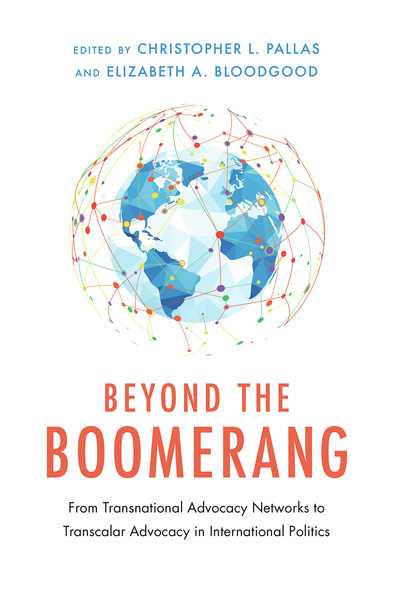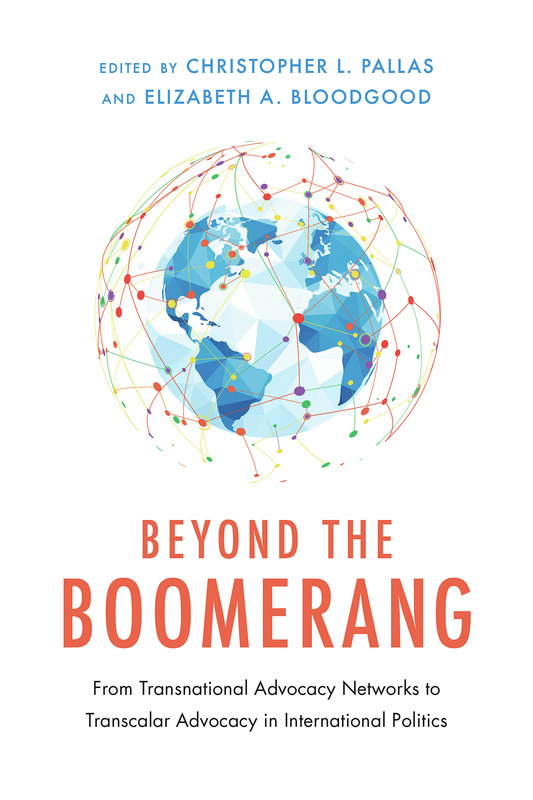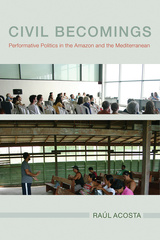
264 pages, 6 x 9
7 B&W figures - 1 map - 6 tables
Hardcover
Release Date:15 Mar 2022
ISBN:9780817321147
Beyond the Boomerang
From Transnational Advocacy Networks to Transcalar Advocacy in International Politics
Edited by Christopher L. Pallas and Elizabeth A. Bloodgood; Afterword by Jan Aart Scholte; Foreword by Marisa von Bülow
University of Alabama Press
Essays that generate a new, empirically grounded theory of transnational advocacy
Margaret E. Keck and Kathryn Sikkink introduced the boomerang theory in their 1998 book, Activists beyond Borders: Advocacy Networks in International Politics. It remains one of the first broadly applicable theories for why groups of NGOs and interested individuals form transnational advocacy networks. Since its publication, however, the empirical conditions that prompted their theory have changed. The types of actors involved in transnational advocacy have diversified. Northern NGOs have lost power and influence and have been restricted in their access to southern states. Southern NGOs have developed the capacity to undertake advocacy on their own and often built closer relationships with their own governments. The architecture of global governance has likewise changed, providing new avenues of access and influence for southern voices.
In Beyond the Boomerang: From Transnational Advocacy Networks to Transcalar Advocacy in International Politics, editors Christopher L. Pallas and Elizabeth A. Bloodgood offer cutting-edge scholarship that synthesizes a new theoretical framework to develop a coherent, integrated picture of the current dynamics in global advocacy. This new theory of transcalar advocacy focuses on advocacy activities and policy impacts that transcend different levels or scales of political action. In transcalar advocacy, all NGOs–northern and southern–are treated as strategic actors, choosing the targets, scales of advocacy, and partnerships that best suit their capacities and goals. The case studies in the volume develop the empirical grounding of this theory using data from Latin America, Africa, Europe, and Asia, with several chapters featuring cross-national comparison. The chapters highlight the wide variety of actors involved in advocacy work, including NGOs, social movements, international institutions, governments, and businesses. Contributors use both qualitative and quantitative methodologies and bring to bear insights from political science, international relations, and sociology. The case studies also include diverse issue areas, from women’s rights to environmental protection, sustainable agriculture, health policy, and democracy promotion.
Margaret E. Keck and Kathryn Sikkink introduced the boomerang theory in their 1998 book, Activists beyond Borders: Advocacy Networks in International Politics. It remains one of the first broadly applicable theories for why groups of NGOs and interested individuals form transnational advocacy networks. Since its publication, however, the empirical conditions that prompted their theory have changed. The types of actors involved in transnational advocacy have diversified. Northern NGOs have lost power and influence and have been restricted in their access to southern states. Southern NGOs have developed the capacity to undertake advocacy on their own and often built closer relationships with their own governments. The architecture of global governance has likewise changed, providing new avenues of access and influence for southern voices.
In Beyond the Boomerang: From Transnational Advocacy Networks to Transcalar Advocacy in International Politics, editors Christopher L. Pallas and Elizabeth A. Bloodgood offer cutting-edge scholarship that synthesizes a new theoretical framework to develop a coherent, integrated picture of the current dynamics in global advocacy. This new theory of transcalar advocacy focuses on advocacy activities and policy impacts that transcend different levels or scales of political action. In transcalar advocacy, all NGOs–northern and southern–are treated as strategic actors, choosing the targets, scales of advocacy, and partnerships that best suit their capacities and goals. The case studies in the volume develop the empirical grounding of this theory using data from Latin America, Africa, Europe, and Asia, with several chapters featuring cross-national comparison. The chapters highlight the wide variety of actors involved in advocacy work, including NGOs, social movements, international institutions, governments, and businesses. Contributors use both qualitative and quantitative methodologies and bring to bear insights from political science, international relations, and sociology. The case studies also include diverse issue areas, from women’s rights to environmental protection, sustainable agriculture, health policy, and democracy promotion.
For those seeking the latest in theories of transnational activism and the varied new players involved, this volume is of great use. It pioneers a promising transcalar approach, demonstrating its utility with case studies of issues as varied as climate change, HIV/AIDS, and growing threats to activists in many societies. Spanning the globe in its empirical coverage and probing the limits of mainstream analytic techniques, Pallas, Bloodgood, and their contributors make a significant contribution to international relations.’
—Clifford Bob, author of Rights as Weapons: Instruments of Conflict, Tools of Power
‘This book is absolutely indispensable for all scholars and practitioners interested in the evolution of the field and those who enjoy first class research.’ —Nonprofit Policy Forum
Beyond the Boomerang develops a theory of transcalar advocacy that provides a counterpoint to prevailing assumptions about global issue-based networks. Supported by case studies using a variety of research methods, the volume updates our understanding of how activists work in a global context. The authors highlight initiatives of advocates at local, regional, and global levels, demonstrating that activism on a variety of issues may be conditioned by national circumstances, but is no longer limited to a reactive approach to the nation-state or dependent on leadership from northern NGOs.’
—Ann Marie Clark, author of Diplomacy of Conscience: Amnesty International and Changing Human Rights Norms and coauthor of Sovereignty, Democracy, and Global Civil Society: State-Society Relations at UN World Conferences
This excellent collection presents a ground-breaking new conceptualization of the latest phase of the global associational revolution: the growing capacity of the Global South’s civil society to build effective advocacy networks and alliances without having to rely on Northern NGOs. The resulting emergence of transcalar advocacy heralds the expansion of scope, locus and direction of transnational advocacy activities. This important volume frames the issue effectively and will help shape the international advocacy discourse for years to come.’
—Stefan Toepler, coeditor of The Routledge Companion to Nonprofit Management and the International Encyclopedia of Civil Society
Christopher L. Pallas is associate professor of conflict management at Kennesaw State University. He is author of Transnational Civil Society and the World Bank: Investigating Civil Society’s Potential to Democratize Global Governance.
Elizabeth A. Bloodgood is associate professor of political science at Concordia University.





